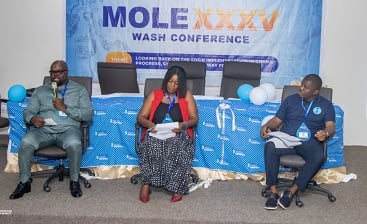Professor Simon Mariwah from the Department of Geography and Regional Planning has brought to light the alarming death toll associated with preventable water, sanitation, and hygiene (WASH)-related diseases in Ghana. According to the World Health Organization (WHO), Ghana recorded approximately 7,635 WASH-related deaths in 2019—roughly translating to 21 deaths daily. At the ongoing MOLE XXXV conference, he emphasized the dire consequences of inadequate access to WASH services, which affects health, wealth, and dignity, particularly in developing nations like Ghana. Reports from WHO and UNICEF in 2023 reveal significant disparities in WASH access, emphasizing that these inequalities are unfair and avoidable, shaped by factors such as geographical location, socioeconomic status, and education level.
The MOLE XXXV conference, organized by the Ghana Coalition of NGOs in Water and Sanitation (CONIWAS) and supported by the Ministry of Sanitation and Water Resources along with UNICEF, explores the implementation of Sustainable Development Goal 6 (SDG 6) in Ghana. The conference’s theme is “Looking Back on SDG 6 Implementation in Ghana: Progress, Challenges, and Ways Forward,” and discusses institutional alignment, policies, and strategies for achieving improved WASH services. Prof. Mariwah underscored the urgent need for advancements in basic sanitation, highlighting that Ghana struggles to provide safe water and hygiene services. Improved sanitation can greatly diminish instances of diarrhea and help prevent waterborne diseases, while also fostering dignity and promoting gender equality—issues particularly relevant to women and girls, who are disproportionately impacted by inadequate sanitation facilities.
To accelerate progress in sanitation, Prof. Mariwah urged collective action from the government, development partners, civil society organizations, and individuals. He underlined how prioritizing WASH services can dramatically reduce mortality rates, elevate public health standards, enhance dignity, and contribute to Ghana’s broader socio-economic development. Raising awareness about the significance of improved sanitation and hygiene is paramount, particularly in rural areas where inadequate access often leads to harmful practices that contaminate water sources and spread diseases. The lack of effective waste management infrastructure exacerbates these challenges, creating additional health hazards and environmental pollution.
The conference also featured prominent voices like Ms. Beata Awinpoka Akanyani, Chairperson of CONIWAS, who affirmed the critical role of WASH in meeting the Sustainable Development Goals. She highlighted the multifaceted impact of WASH on public health, education, economic growth, social equity, and environmental protection. Alongside the main conference events, CONIWAS organized a WASH sector exhibition, collaborating with various organizations such as the GAMA Sanitation and Water Project and World Vision Ghana, demonstrating a unified effort in advancing WASH initiatives.
Ing. Harold Esseku, a Senior Water and Sanitation Specialist at the World Bank Ghana, called for the integration of circular economy principles and climate adaptation into WASH services. He emphasized the necessity of resilient infrastructure that can withstand the varied impacts of climate change and related shocks. The opening ceremony, chaired by Togbe Tepre Hodo IV, Paramount Chief of Anfoega, drew various dignitaries, including the Volta Regional Minister, Dr. Archibald Yao Letsa, and development partners, further highlighting the high-level commitment to addressing WASH challenges in Ghana.
The five-day MOLE XXXV Conference brought together a diverse group of participants, including members from IRC Ghana, World Vision Ghana, the GAMA/GKMA Sanitation and Water Project, and the Ghana WASH Journalists Network, among others. This collective gathering of experts, practitioners, and civil society representatives marked a pivotal step toward addressing the pressing issues surrounding WASH in Ghana, fostering a collaborative environment to share insights and strategies for advancing the country’s WASH objectives. The discussions and initiatives that emerge from this conference are vital for shaping effective policies and practices to mitigate the health impacts of inadequate water, sanitation, and hygiene services while driving socio-economic development forward.














